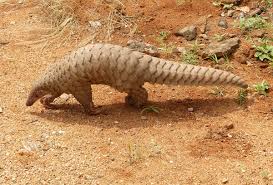Wild Africa, a non-governmental organisation (NGO), has called for the speedy passage of the bill to protect Pangolins, which is pending before the National Assembly.
According to the NGO, the bill if passed will prevent them from going into extinction
The NGO also urged support for ongoing efforts to update the national wildlife legislation to combat wildlife trafficking.
This is contained in a statement issued by Wild Africa Nigeria Representative, Festus Iyorah on the occasion of Pengolin Day, on Saturday in Lagos.
Iyorah noted that pangolins were protected by both national and international laws, including the 2016 ban on international commercial trade.
According to him, the high demand for their scales used in ‘traditional medicine, especially in Asia and their meat eaten as a delicacy, is driving them to extinction.
He said that Nigeria had emerged as a global export hub and a prominent player in the supply of pangolin scales primarily to Asia.
He added that Nigeria was linked to 55 high rate of pangolin scales seized globally between 2016 and 2019.
Iyorah quoted Dr Mark Ofua, Wild Africa’s West Africa Spokesperson as saying: “it is not too late to change the narrative and move Nigeria from its current status as a major trafficking hub to become one of Africa’s strongest protectors of pangolins.
“It is our collective responsibility to achieve this task.
“No action is too small when it comes to protecting pangolins, and we must all work together to discourage illegal bush meat trade and support new laws to combat wildlife trafficking.”
Iyorah said that as part of efforts to raise awareness about pangolins, Wild Africa was using a combination of radio, TV, billboards and public service announcements.
He added that the campaign would feature influential Nigerian ambassadors such as 2Baba, Emanuella, and Ali Baba to highlight threats facing pangolins and their crucial role in the ecosystem.
“On its part, Nigeria has taken significant steps to combat the illegal trade of pangolin scales through legislative measures and enforcement.
“In early 2024, Nigeria introduced the Endangered Species Conservation and Protection Bill, which recently passed second reading.
“If enacted, the bill would impose harsher penalties for trafficking in illegal wildlife products such as pangolin scales and deter wildlife crime.
“Seizures of pangolin scales and other illegal wildlife products, as well as prosecutions of such cases, are also on the rise,” he said.
He noted that in December 2024, the Nigeria Customs Service (NCS) arrested a suspected pangolin scale broker and confiscated 2.179 tonnes of pangolin scales, representing approximately 1,100 pangolins.
“Since July 2021, the NCS and its partners have conducted 16 operations, 35 arrests and 12 convictions, seizing 21,582 tonnes of pangolin scales,” Iyorah said.
He said that in spite of these successes, pangolin population remain at risk, particularly with the demand for their scales in Asian countries like China, where the scales were falsely believed to have medicinal properties.
He said that in its latest submission to the 78th Meeting of the UN CITES Standing Committee, China proposed a 90 per cent reduction in pharmaceutical and hospital use of pangolin scales by 2026.
He added that China also proposed a 50 per cent drop in overall medicinal use of pangolin scales, with an annual consumption quota of one metric tonne.
“While this represents significant progress, conservationists worry that even a one-tonne quota can still fuel illegal trafficking, further endangering the species,” Iyorah said.
He said that Pangolins remained underappreciated and under protected and were in urgent need of global attention and support.
“On World Pangolin Day, Wild Africa urges the Nigerian public to join the fight against poaching by reporting illegal wildlife trade and supporting local conservation projects,” Iyorah added.
Pangolins play a huge role in maintaining a balance in biodiversity as taking of pangolins from their wild homes poses a serious threat to biodiversity and the health of their habitats.
Pangolin diet consists of ants, termites, crickets, flies, and other insect species; these animals help prevent the overpopulation of insects and protect forests from termite destruction.
It is estimated that just one pangolin consumes about 70 million ants and termites per year—when you think about the illegal trade of pangolins, imagine the hundreds of millions of extra bugs crawling around.
There is an economic impact, too, as it is estimated that pangolins save us millions of dollars per year by preventing damage from pests.
Pangolins also benefit the soil in which they burrow. By digging holes in the ground, they support the turnover of organic matter and aeration.
NAN


